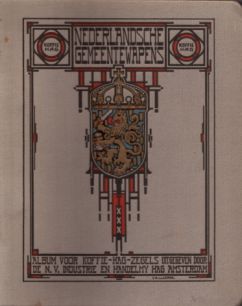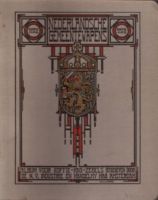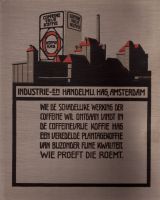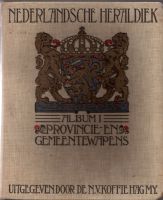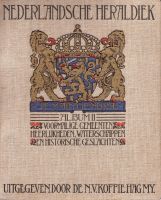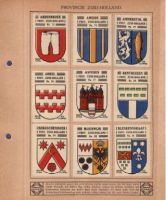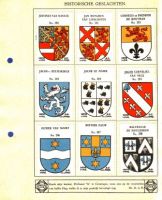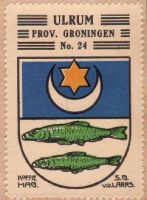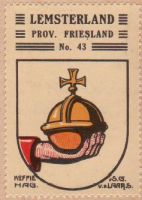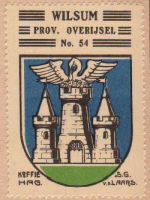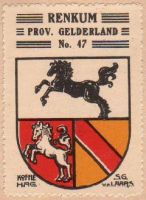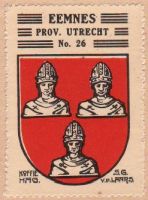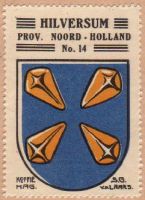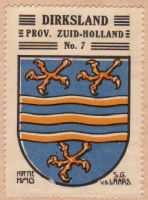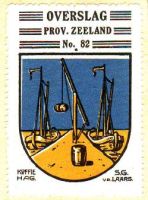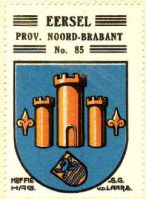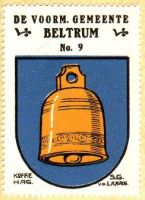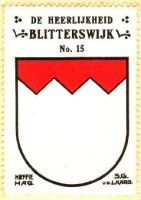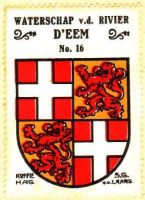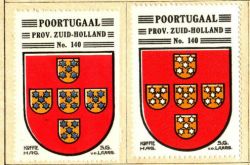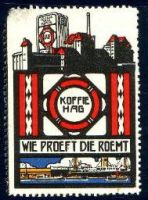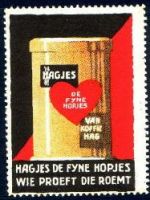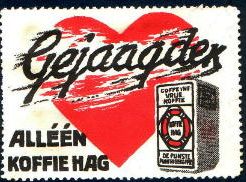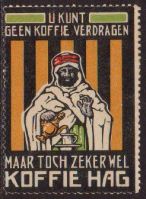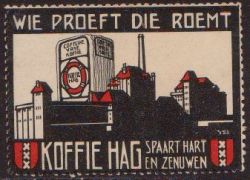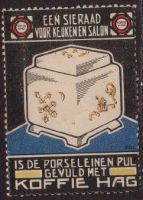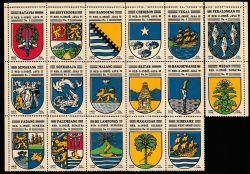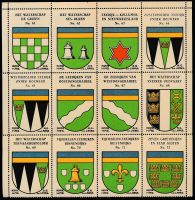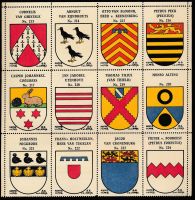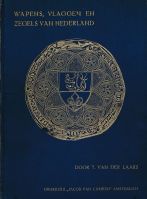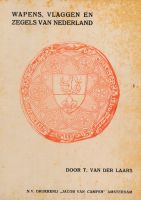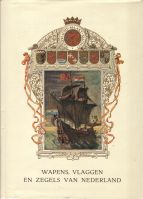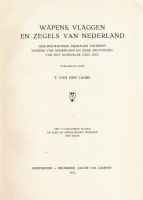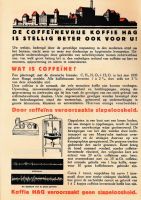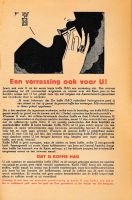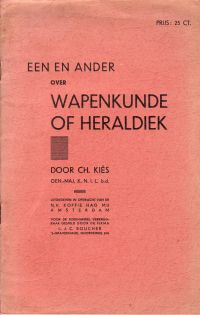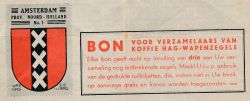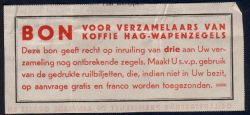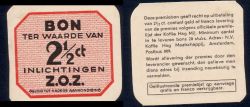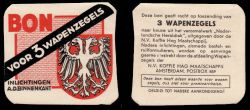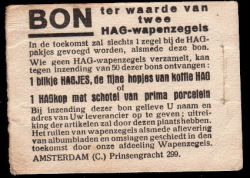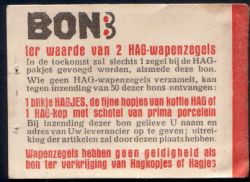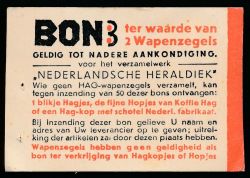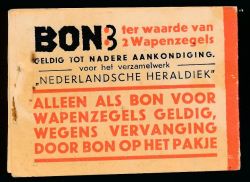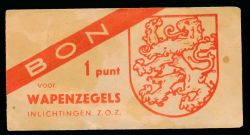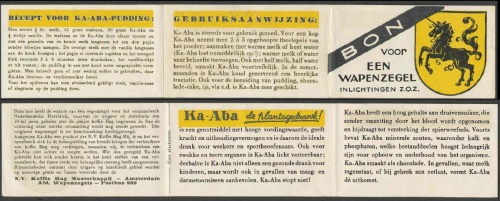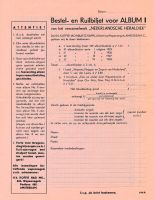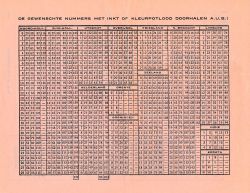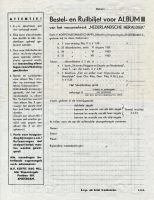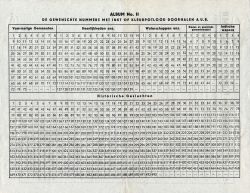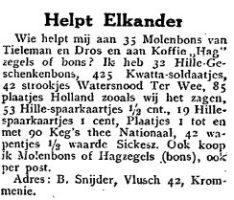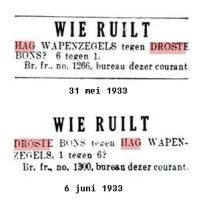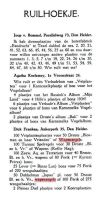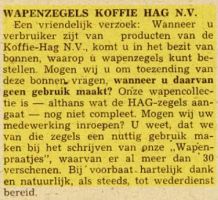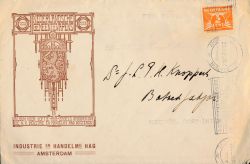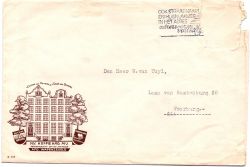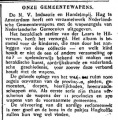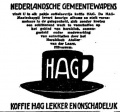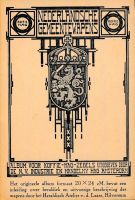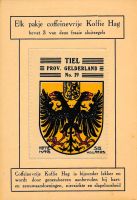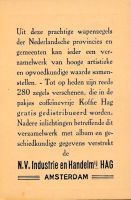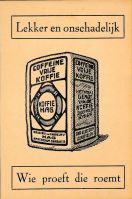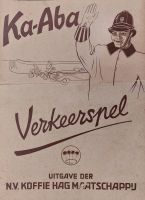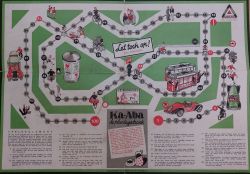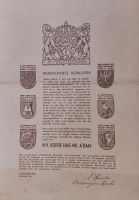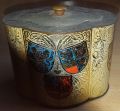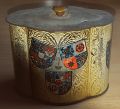Koffie Hag albums: Difference between revisions
Knorrepoes (talk | contribs) No edit summary |
Knorrepoes (talk | contribs) |
||
| Line 74: | Line 74: | ||
File:sluitzegel5.hag.jpg|alt=Koffie Hag sluitzegel|additional stamp 5 | File:sluitzegel5.hag.jpg|alt=Koffie Hag sluitzegel|additional stamp 5 | ||
File:sluitzegel6.hag.jpg|alt=Koffie Hag sluitzegel|additional stamp 6 | File:sluitzegel6.hag.jpg|alt=Koffie Hag sluitzegel|additional stamp 6 | ||
</gallery> | |||
Like for every country, the stamps were printed in sheets. Unfortunately I have no complete sheets, but based on the incomplete sheets, it can be concluded that the stamps were issued in sheets of 6 or 4 per row, with rows of 4 most common. The stamps were printed in sequence horizontally, but some strange combinations exist of 2 provinces in one sheet. I have no information how many rows per sheet were printed. | |||
<gallery widths=250px heights=200px perrow=0> | |||
File:sheet6.hag.jpg|alt=Koffie Hag vel|Sheet row size of 6 (Dutch East Indies), series 1 | |||
File:sheet4b.hag.jpg|alt=Koffie Hag vel|Sheet row size of 4, series 1 | |||
File:sheet4.hag.jpg|alt=Koffie Hag vel|Sheet row size of 4 (Waterboards), series 2 | |||
File:sheet4a.hag.jpg|alt=Koffie Hag vel|Sheet row size of 4 (Families), series 2 | |||
File:sheetmixed.hag.jpg|alt=Koffie Hag vel|Sheet fragment with two provinces | |||
</gallery> | </gallery> | ||
Revision as of 17:15, 9 September 2023
Album information :
- Issued by : Koffie Hag, Amsterdam
- Date of issue : 1924-35, availability of the stamps until late 1940s.
- Number of stamps/cards : 1872
- Image variants : One different image, approx. 20 different reprint
Company
For information on the company, see the overview of Coffee Hag albums.
Albums
The Dutch albums were issued in two series.
The first series was issued as Nederlandsche Gemeentewapens between 1924 and 1928. These series only showed the municipal arms in the Netherlands and the Netherlands East Indies (present Indonesia, but also including the arms of Suriname in South America). For the stamp-pages hardcover albums or a cardboard box were available. The cover showed the small National Arms. The side showed the text Nederlandsche Gemeentewapens, and the back advertising for the company. The total collection consisted of 1027 stamps and generally three hardcover albums were needed.
The second series were issued between 1931 and 1935 as Nederlandsche Heraldiek and showed the arms of new or changed municipal arms, new and changed arms in Netherlands East Indies, the arms of the water boards, the officially registered arms of Houses, Castles, Estates and similar, the arms of former municipalities and two series of personal arms. These personal arms were of important Dutch and foreign families and persons during the 80-years war of independence (1568-1648) of the Netherlands against Spain. The total number of arms issued was 841.
When the second series were issued, new covers were designed and issued; one for the first series and one for the second series. However, people could still collect the album pages in the loose boxes or in the old albums.
The Dutch albums are unique in the total Coffee Hag series in Europe. No other series shows arms from outside Europe (Netherlands East Indies and Surinam), obsolete municipal arms, arms of water boards (a system of local government dealing solely with water management) or arms of Estates. The Dutch albums are not unique with respect to the personal arms (the Norway and Danzig albums also contain personal arms), however, they are unique in that the series also contain many foreign arms, such as arms of Popes, Kings and foreign dignitaries who played a role during the 80-years war. In 1930/1 it was also mentioned that arms of religious bodies (churches, dioceses) would be included, but these were never published.
Within the Netherlands all government arms are registered at the Hoge Raad van Adel in The Hague. This register thus includes provincial, municipal arms as well as the arms of water boards. During the early years of its existence (1813-1850) also arms of estates, castles, houses and similar could be registered. Only in 3 cases arms of an estate were granted after 1850 (the most recent in 2004). The Koffie Hag albums contained all arms in the register at the time of publication. The arms of the Netherlands East Indies and the personal arms are not registered. Only arms of Dutch nobility are registered.
The albums were written and the images were drawn by Tiete van der Laars and his son Sytse Gerke van der Laars, who were well known heraldic artists at the time. All stamps show the signature S.G. van der Laars. They also designed the arms for the Belgian albums and the cover for the Polish album.
Stamps issued
All 1872 images/stamps are shown in the pages below. Each page shows all images and for each chapter a pdf is available, these contain the complete album pages and texts.
In addition to the arms stamps, six advertising stamps were issued as well:
Like for every country, the stamps were printed in sheets. Unfortunately I have no complete sheets, but based on the incomplete sheets, it can be concluded that the stamps were issued in sheets of 6 or 4 per row, with rows of 4 most common. The stamps were printed in sequence horizontally, but some strange combinations exist of 2 provinces in one sheet. I have no information how many rows per sheet were printed.
Information on coffee, Koffie Hag and heraldry
These pages appeared on different parts of the albums, either on the back of an empty page, or as separate pages.
The latter can be placed anywhere in the albums and are often absent. All pages are combined in the file below:
Additional heraldic books by Koffie Hag
In 1913 Tiete van der Laars issued in 1913 a book ‘Wapens, Vlaggen en Zegels van Nederland', dealing mainly with the National and provincial arms and some general heraldic texts. This book was issued in two versions, with a white and a blue cover. The initial letters on the 1913 book were printed in red.
The book was reprinted by Koffie Hag around 1927-1930, but no new date is mentioned in the books. The book was identical to the original 1913 version, but was reprinted with the titles on the cover page fully black. No reference of the Koffie Hag company was made on the front or the main text of the book. Only in the back additional promotion material was added/glued. This promotional material, strangely enough, only contains information on the (claimed) health effects of caffeine-free coffee. No reference is made to the heraldic albums. At least two different sets of promotional material have been used, probably more sets have been used. No date is mentioned, but in one of the texts a quote from a doctor is dated a 1.10.'27. In my other book on the other hand is a statement that the book was presented as a gift on June 17, 1927. The reprint thus probably dates from (early) 1927 and either different sets of promotional material were added to the same edition during the years, or the book was at least printed twice in 1927/1928. But no later as 1930, when the book was reprinted again.
On the 1930 version the name of the Koffie Hag company is now mentioned in front. The 1930 version also has a different printer (see the front) and an additional preface by S. van der Laars, where he also thanks Koffie Hag. The promotional material was no longer added, but instead a number of pages were included on the heraldic albums and the benefits of coffein free coffee. These were now printed in the same style and font as the rest of the book. This section is dated as Amsterdam, 1930 and this date appears only at the end of the book, not in front.
It is hard to keep the issues apart, as in all 4 issues the main text, including the internal front covers and preface(s) are identical and all state 1913. All 1913-1930 issues have 176 numbered pages. Without the Hag additions that is.
Finally the book was again reprinted in 1989, but now with a different dust cover and a clear colophon indicating a new reprint.
Different issues of Wapens, Vlaggen en Zegels van Nederland:
In addition to the above book and albums, Koffie Hag also published a booklet on heraldry as such; ‘Een en ander over Wapenkunde of Heraldiek`, by Ch. Kiès.
Collecting
People could collect the stamps by collecting first coupons for the stamps and sending their order to a special department of the company in Amsterdam. Or by exchanging stamps with other collectors.
Coupons
To get the stamps for the albums the company issued coupons, similar as in the other countries. These coupons were added to the different products of the company, but were also printed on for example advertising material. Coupons could be exchanged for stamps or albums. See below for a number of examples of coupons issued.
An example of a complete coupon-booklet, can be seen here.
Besides the coupons issued by Koffie Hag, some other (daughter) companies participated in the system, such as Ka-Aba and Makota. Below an example of a coupon issued by Makota Coffee and Tea and a booklet from Ka-Aba.
Ordering
People received their coupons (or sometimes stamps) when buying the coffee from Koffie Hag or Koffie Sanka. To complete the albums it was possible to exchange duplicate stamps or to buy or order by additional stamps. For this special forms were printed and provided with the albums. The form could also be used to order the album sheets, the books published by the company or other material.
An example of a brochure with information how to order, can be seen here.
Special lists for ordering or exchanging stamps:
The lists were either published separately, or were part of larger brochures on the albums. See below for the brochures.
Stamps were also sought after and exchanged by collectors for stamps of other companies, as shown in the advertisements below:
Organisation
The stamps were issued by a separate department of the company, the Afdeeling Wapenzegels. They used their own stationery, but the arms were also used on the more generic stationery of the company.
International orders
It was possible to obtain not only Dutch, but also stamps from other countries through the Dutch company. Instead of coupons, the stamps and albums were also sold normally after paying by bank transfer. The company thus issued price lists of the available material.
Below an example of a price list from 1932. Not all countries had been issued at the time, or were not yet completed.
Below an interesting price list of September 1940, just after the start of the Second World War. As the albums were ordered in other countries, is is mentioned at the end of the letter that delivery times are longer than usual and that the French and UK albums are not available at all (they are listed though). The Polish and Czechoslovak albums are not listed at all.
Advertising
The issuing of the stamp albums was also promoted in the general advertising of the company in journals and magazines. Several examples are shown below, dating from 1927-36.
Announcements of the release of the albums itself in newspaper articles, some examples are shown below :
- Error creating thumbnail: File with dimensions greater than 12.5 MP
De Groene Amsterdammer 23-12-1933
General advertisement with reference to the albums was very popular. Advertisements appeared in many local and national newspapers. Very often the advertisment was identical as used in other countries. In different newspapers different arms could be used in the same advertisement. The asvertisements also were used in the Dutch East Indies at the time, using different images of arms.
Selected by date :
A series of advertisements for a new factory in 1936, with the images of the albums:
Other material
Mini folder
This is a small folder (7x10 cm) issued in 1926-1927 to promote the albums. It has 4 pages; the first page looks like the album cover, the second has a stamp (different stamps were used), the third provides background and the back is advertising for the company. The issue date is not mentioned, but estimated based on the text: '280 stamps have been issued'
Promotion letters
In 1930 the company issued a leaflet to new customers on the albums and the arms series. Click here for the leaflet (4 pages).
When the second series of stamps were issued the company sent a promotion letter to all known customers and/or buyers of the first series to announce the second series. The letter, dated November 1933, states that new series were to be issued, but mentions only the series about ‘New and changed municipal arms', the second series of Netherlands East Indies, and the first series of the personal arms. The other series were not mentioned and probably not planned at the time.
(Click on pictures to enlarge)
Promotion Brochures
Besides the advertising in newspapers and journals, the company also issued specific promotional brochures for the albums. Several versions of these exist:
- Brochure 1 : 4 pages. Recognisable features are 1) the list of errata only list 9 stamps and 2) last page has advertisement for 'Hagjes' and 3) this brochure still has an ordering list. These were later issued separately. Date : Summer/Autumn 1931, as the second album is expected to be available before December 5, 1931. File:Hag-nl-brochure1.pdf
- Brochure 2 : 4 pages. Recognisable features are 1) on the first page the second series of Album II is to be issued and 2) the date of February 1932 stated on page 3. There is no ordering list anymore. File:Hag-nl-brochure2.pdf
- Brochure 3 : 4 pages. Recognisable features are 1) the list of stamps of the second series of Album II on the first page and 2) on the last page the series V and VI can be collected. Date : probably December 1, 1933 as this date is printed on the last page bottom left. File:Hag-nl-brochure3.pdf
A special promotion brochure was issued in 1936 and measured only 5,5x 5 cm and has 18 pages:
The albums were also mentioned in the general promotion brochures and catalogues of the company. One could collect points not only for the albums, but also for other items. All these items were also for sale directly, by placing an order with the local grocery. Three such lists are shown here, all without date.
Children's contest
A unique advertising feature, only used in Holland as far as I know, were colouring contests for children. Children of different ages could colour some of the arms.
At least four contests were run; one in 1925, in 1929, in 1930 in the Dutch East Indies, and in 1934.
First Contest :
- Official announcement leaflet first contest File:Nl-contest1929.pdf
I have not much information on this contest, except a letter to a winner from 1925.
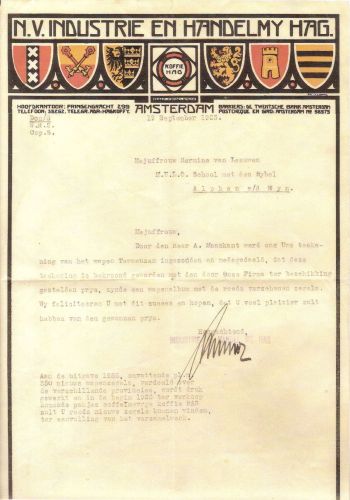 (click to enlarge)
(click to enlarge)
Second Contest:
For this I have some announcements and results from newspaper articles as well as the official announcement brochures:
- Official announcement leaflet second contest File:Nl-contest1929a.pdf
Third Contest:
This was basically the same as the second Dutch contest, but run in the Dutch East Indies.
- Error creating thumbnail: File with dimensions greater than 12.5 MP
Announcement (Het nieuws van den dag voor Nederlandsch-Indië 25-07-1930)
Fourth contest:
For this the company issued in 1934 a leaflet with three uncoloured large size arms. The easiest, Wassenaar, was for children up to 12 years of age, the second (Lopik) for 13 and 14 year olds and the most difficult one (Avenhorn) was for children older than 15 years. for each category a number of prizes was available. The drawings were to be send before May 15, 1934.
Traffic game
In 1939 the company issued a board game for children to promote traffic safety. The game is nearly A3 in size and issued under the Ka-Aba cocoa drink brand. The reverse shows advertising for the heraldry albums.
Other
An heraldic can:

